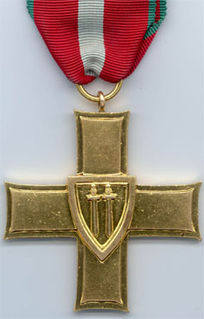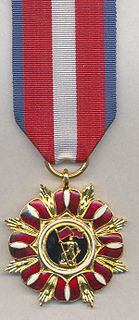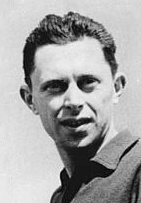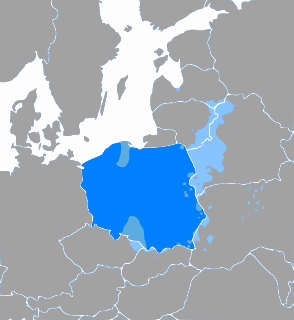The złoty, which is the masculine form of the Polish adjective 'golden', is the currency of Poland. The modern złoty is subdivided into 100 groszy. The recognised English form of the word is zloty. The currency sign, zł, is composed of the Polish lower-case letters z and ł.

The Order of Merit of the Republic of Poland is a Polish order of merit created in 1974, awarded to persons who have rendered great service to Poland. It is granted to foreigners or Poles resident abroad. As such it is sometimes referred to as a traditional "diplomatic order".

Dziennik Ustaw or Dziennik Ustaw Rzeczypospolitej Polskiej is the most important Polish publication of legal acts. It is the only official source of law for promulgation of Polish laws. The publication of this journal is solely the responsibility of the Prime Minister of the Republic of Poland. 'Dziennik Ustaw' traces its history to the 1918 'Dziennik Praw Królestwa Polskiego' and has changed its name several times during its existence.

Osadniks were veterans of the Polish Army and civilians who were given or sold state land in the Kresy territory ceded to Poland by Polish-Soviet Riga Peace Treaty of 1921. The term is a Polish word, also a loanword used in Soviet Union.

The Constitution of the Polish People's Republic was passed on 22 July 1952. Created by the Polish communists in the Polish People's Republic, it was based on the 1936 Soviet Constitution, and it superseded the post-war provisional Small Constitution of 1947 which, in its turn, had declared null and void the pre-war April Constitution of Poland passed by the Polish Sejm in 1935. The Russian text of the Constitution was reviewed and 'corrected' by Joseph Stalin himself, and later translated into Polish. It legalized the communist legislature and practices as they had been introduced to Poland with the Polish Committee of National Liberation in the wake of Red Army progress in 1944.

The Order of the Cross of Grunwald was a military decoration created in Poland in November 1943 by the High Command of Gwardia Ludowa, a World War II Polish resistance movement organised by the Polish Workers Party. On 20 February 1944 it was confirmed by the State National Council and on 22 December by the Polish Committee of National Liberation and further confirmed on 17 February 1960 by the government of the People's Republic of Poland.

Order of the Builders of People's Poland was the highest civil decoration of Poland in the times of the People's Republic of Poland.

The Medal of the 10th Anniversary of People's Poland is a former Polish civil state award established by the Council of State on 23 May 1954 to recognize services to the state.

Wojciech Juliusz Siemion was a Polish stage and film actor. He studied law at the Catholic University in Lublin from 1947 to 1950. At the same time, he attended acting classes at a local theatre. He enrolled at the State Theatre Academy in Warsaw and after just one month, was able to skip two years of studies. Upon graduation in 1951 he began acting in several theatres and cabarets including Pod Egidą. In 1983, he became a member of the council of the Patriotic Movement for National Rebirth, and in 1985–1989 served as a member of the Sejm from the Polish United Workers' Party. After the fall of the communist regime in Poland, Siemion became a member of the Polish People's Party and served in the regional legislature of the Masovian Voivodeship. Siemion was awarded many cultural and state awards, including the Order of Polonia Restituta.
Polish campaign stars were established on 14 June 2007 to recognize military and civilian participants of overseas missions since 2002. Polish personnel must have been present for at least one day. Foreigners may be presented with a campaign star for collaborating with Polish forces during the mission.

The Medal of the 40th Anniversary of People's Poland is a former civil decoration of Poland established by the Sejm on 26 April 1984 to recognize the contribution of working people in the development of the socialist state. It was awarded between 22 July 1984 and 22 July 1985. It was disestablished in 1992.

Mieczysław Stefan Wilczewski was a Polish cyclist. He competed at the 1960 Summer Olympics in the 100 km team time trial and finished in 10th place. He won the Tour de Pologne in 1953. That same year he was awarded the Silver Cross of Merit by the Polish government for his accomplishment. In the 1970s he emigrated to the United States, and he died in Cocoa Beach, Florida in 1993.

The Majdanek State Museum is a memorial museum and education centre founded in the fall of 1944 on the grounds of the Nazi Germany Majdanek death camp located in Lublin, Poland. It was the first museum of its kind in the world, devoted entirely to the memory of atrocities committed in the network of slave-labor camps and subcamps of KL Lublin during World War II. The museum performs several tasks including scholarly research into the Holocaust in Poland. It houses a permanent collection of rare artifacts, archival photographs, and testimony.
The following events occurred in July 1955:
Józef Ciągwa, slov. Jozef Čongva – Polish lawyer of Slovak origin, translator, lecturer at University of Silesia in Katowice, professor of jurisprudence and President of the Management Board of Slovaks in Poland Association.

Maciej Stanisław Rayzacher is a Polish theatre and film actor, writer, voiceover provider, councillor and an activist of the democratic opposition during the times of the communist Polish People's Republic.

Adam Glapiński is a Polish economist and politician, the current President of the National Bank of Poland, Economics professor, a member of the first term of the Sejm, a member of the fourth term of the Senate and between 2010–16 a member of the Monetary Policy Council. He also served as the Minister for Construction and Spatial Planning and later as the Minister for Foreign Economic Cooperation.

Jan Drohojowski (1901-1979) was a Polish diplomat for the governments of the Second Polish Republic and later, Polish government in exile and the People's Republic of Poland.

Małgorzata Barbara Niemczyk-Wolska is a female Polish volleyball player, coach, and member of the Sejm.

















